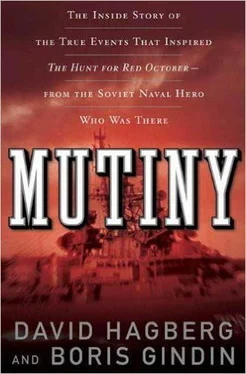Boris Gindin was especially filled with the Rodina. He had never been a devout Jew, but now out of the academy and in the fleet he’d fully replaced his Jewish religion with the religion of the state. He was on a holy mission, as were many Soviet officers. He wanted to do well so that he would be noticed. He wanted to have a life for himself. To get married, to have children, to have a nice apartment, maybe even a summer house, that most Russian of retreats, the dacha.
As a Soviet navy officer Gindin is allowed to shop in the Albatros or Bereska special stores that are stocked with imported goods.
As a Soviet navy officer he can smoke American cigarettes. Walking down the streets of Leningrad with a package of Marlboros in his pocket makes him feel nine feet tall. It sounds stupid, and maybe even foolish, but in ′75 people had nothing, so some little luxury gave you a sense of self-worth and an enormous satisfaction with the lifestyle you could afford.
Gindin will do anything to defend the Rodina and protect this life. He loves his father but won’t end up in the same boat, earning a lousy 160 rubles per month, when it costs more than 110 rubles a month just to keep food on the table for four people! Which means he’s going to do a good job in the academy, then go out into the fleet, where he will distinguish himself.
In exchange for a five-year education, the Soviet naval officer has one term of enlistment, and it is for twenty-five years. There’s no getting around it. But it’s not a hardship, because navy officers are privileged.
They stand among the high priests of the Communist regime.
In the summer of 1968, after his first year at the academy, Boris leaves from Kronshtadt aboard the T-58-class large patrol craft Kirov, a different vessel than the WWII heavy cruiser or the late eighties battle cruiser. But this ship, as old as he is, is good enough to train first-year students.
Except one night, sleeping on a hard cork mattress, Gindin is awakened to the screams of Jurij Kotovshhyk, one of the cadets in his cubrick. A gigantic rat is sitting on the boy’s chest, calmly grooming itself.
When the lights come on, dozens of rats scurry away into the dark corners. It’s Gindin’s first taste of the real navy with which Moscow expects to defend the Rodina against the soft Americans.
But it won’t be his last on this summer cruise in 1968.
One morning the captain announces over the ship’s intercom that the people of Czechoslovakia are about to start a revolution. They want to overthrow the Russian brand of Socialism. The Kirov’s crew is issued with Kalashnikov assault rifles and ammunition. They are to sail from their base at Kronshtadt to Czechoslovakia to put down the revolt.
“I was excited and scared all at the same time,” says Gindin. “I signed on to defend the Rodina with my life if need be. I’d promised the admiral. We’d all made the promise. But not one of us ever believed it would really come to this. Not like this. Not so soon.”
Gindin and the other cadets aboard are just eighteen, and as they steam out into the Baltic to head southwest, maintaining their shipboard routines as well as cleaning their weapons and going over military tactics with their division commanders, no one seems to take note that Czechoslovakia is a country that is completely landlocked.
But it becomes a moot point twenty-four hours later, when the captain announces that the revolt has already been put down by Special Forces (Spetsnaz), Russian Green Berets. Boris is there with Viktor Lugovoj, his best friend from the academy, and Sergei Strogonov who is the commander of their class, none of them certain whether they should cheer that the revolt has been put down, so they won’t have to fight after all, or be disappointed that they won’t get the chance this time of living up to their oaths to defend the Motherland. But the Kirov is ordered back to base. Boris Gindin has taken the first step to becoming an officer in what he fervently believes is the finest navy on the planet.
FEBRUARY 1975
Gindin is on his second rotation aboard the Storozhevoy, regular military duty in the Mediterranean Sea, in Februrary 1975 when the crew gets word that they will cruise south to Cuba, where they will spend one month. This is just eight months before the mutiny, and almost no one aboard has the least premonition that their lives are soon to be ended or altered forever. There isn’t an officer or jack-tar aboard who isn’t over the moon. Cuba, at the time, meant not only sunshine and warmth but also the possibility of visiting ashore for fabulous food and luxuries almost beyond imagination—the girls are said to be beautiful, even if they are out of reach. Whenever the men were allowed off the ship, it was always in a group; even so, visiting ashore was nothing short of wonderful.
The KGB doesn’t maintain a strong presence in Havana. In fact, the only KGB representative the officers and crew will have to contend with on the trip is Captain Lieutenant Sergey Drankov, the dour military intelligence officer assigned to the ship.
Among other things the Storozhevoy’s crew means to do in Havana, besides eat, drink, and sightsee, is provide a little entertainment for their Cuban allies. Gindin figures that it is some gesture of gratitude that the Soviets have a military base there and that the two governments are friends.
One of the plans is for the crews of the Storozhevoy and his brother ship the Silyni, also en route to Havana, to put on a concert of singing and dancing. Capain Potulniy orders the Storozhevoy to come to all stop to wait for the Silyni to rendezvous. They are in the middle of the unpredictable Mediterranean Sea, but the captain means to send a contingent of sailors across in a launch so that the two crews can practice. He wants everything to be just right when they get to Cuba. The USSR is like a big brother, there to show its allies how a world-class navy operates.
The transfer of crewmen goes without a hitch, the three-hour practice is a success, and the little entertainment is ready. The only problem is the weather, which has piped up to 30 knots of wind, with mounting seas rising well above four meters. The Storozhevoy’s crew must be retrieved, but operating a motor launch in those conditions is difficult. Potulniy orders his ship to come around to the windward side of the Silyni to temporarily block the wind and waves for long enough to put the launch over the side, retrieve the crewmen, and make it back across the hundred meters or so of troubled sea.
“The situation went all to hell almost immediately,” Gindin recalls. He is with his men in the engine spaces, taking increasingly desperate orders from the bridge. The two ships are drifting together at an alarming rate, and there simply isn’t enough sea room or enough engine power to stop the Storozhevoy from slamming into the side of the Silyni with a sickening, ship-wrenching crash. The Silyni’s massive anchor breaks loose, some of its enormous chain pays out, and the three tons of metal begin swinging wildly like a wrecking ball bent on destroying everything in its path.
The first damage is a hole three by six meters punched into the Storozhevoy’s hull, thankfully above the waterline. Stanchions and lifelines on deck are the next to go, along with a section of deck plating where the ship’s rockets were loaded aboard.
KGB captain Drankov, sitting at his desk, feels the tremendous crash. He jumps up, throws open the porthole in his cabin, and sticks his head outside, just as the huge anchor swings past, missing him by centimeters. The joke among the crew later is: Too bad he didn’t stick his head out a little farther.
Читать дальше












